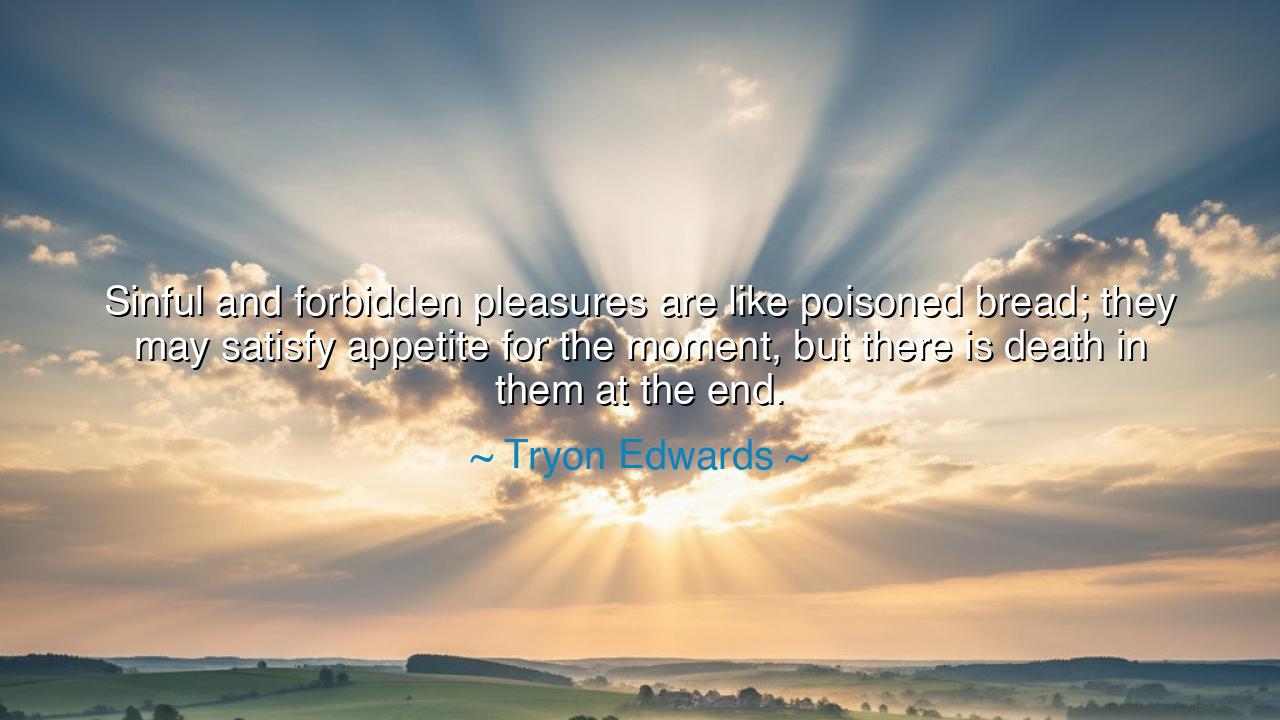
Sinful and forbidden pleasures are like poisoned bread; they may
Sinful and forbidden pleasures are like poisoned bread; they may satisfy appetite for the moment, but there is death in them at the end.






“Sinful and forbidden pleasures are like poisoned bread; they may satisfy appetite for the moment, but there is death in them at the end.” Thus wrote Tryon Edwards, the American theologian and moral philosopher, whose words carried the gravity of ages and the echo of eternal truth. In this image of poisoned bread, he captures the paradox of temptation: that which appears nourishing to the senses often conceals destruction for the soul. His warning is not against pleasure itself, but against those pleasures that lure us away from reason, virtue, and peace. For such indulgences, though sweet in the mouth, become bitter in the heart; they promise joy but deliver ruin.
Tryon Edwards, who lived in the 19th century, was a man devoted to moral instruction and spiritual clarity. His writings, much like those of his ancestor Jonathan Edwards, sought to awaken the conscience of a people seduced by worldly comfort. In this quote, he speaks to the universal weakness of mankind—the tendency to reach for what glitters, to feast upon what pleases in the moment without heed to the poison within. The “forbidden pleasures” he names are not confined to any age or culture. They are the eternal temptations of pride, lust, greed, and deceit—the fruit of the serpent, ever ripe and ever deadly. They fill the belly but starve the soul.
To call them “poisoned bread” is to use a metaphor both vivid and sacred. For bread, in nearly every civilization, is a symbol of life—of sustenance, of daily nourishment, of the blessings of God. Thus, when such a symbol is corrupted, when it becomes “poisoned,” the betrayal runs deep. The very thing meant to sustain us becomes the instrument of our undoing. Edwards’s image warns us that evil rarely appears as ugliness. The devil does not tempt us with decay, but with sweetness; he disguises poison in the form of sustenance. And so, many souls are lost not through open rebellion, but through subtle indulgence—those quiet moments when one says, “Just this once.”
Consider, for example, the story of King David from the ancient scriptures. A man after God’s own heart, he ruled with wisdom and courage. Yet, one evening, his eyes fell upon Bathsheba, and he desired what was forbidden. He took the poisoned bread, savoring the moment’s sweetness—but it brought death into his house, sorrow into his heart, and shame upon his name. What began as a moment of pleasure became a legacy of pain. His story stands as a mirror for all who think that sin can be tasted lightly. The momentary feast became a famine of the spirit, and David learned, as Edwards teaches, that every forbidden pleasure carries a hidden price.
The ancients understood this law well. The Greeks spoke of Tantalus, the king who was condemned to eternal hunger and thirst for offending the gods. He stood forever beneath fruit-laden branches that receded when he reached for them, above clear waters that vanished when he bent to drink. This is the fate of those who chase sinful delights: their satisfaction is an illusion, a torment disguised as reward. The poisoned bread fills only to empty again, leaving the heart hungrier than before. For appetite, once fed by corruption, becomes a beast that cannot be satisfied—it devours joy, purity, and peace until nothing remains.
But Edwards’s message is not only a warning—it is also a path to wisdom. He reminds us that the true pleasures of life are those that nourish without poisoning, that uplift without enslaving. Righteous joy, love that is pure, work that is honest, and truth spoken in courage—these are the foods of the spirit. They do not burn the tongue with guilt nor leave the heart sick with regret. The wise must learn to discern the difference: to look beyond the surface sweetness and ask whether the bread they eat gives life or brings decay. For discernment is the shield against corruption, and self-control is its sword.
So, my child, take this teaching deep into your soul: do not feast upon what glitters falsely. When the world lays before you its banquet of forbidden delights—rich with vanity, deception, and lust—remember that beneath the golden crust lies poison. Ask always: does this nourish my spirit, or does it wound it? Seek pleasure that endures beyond the hour, joy that does not fade with the night. For to live wisely is not to deny pleasure, but to choose the kind that gives life instead of death. Let your heart hunger not for the fleeting sweetness of sin, but for the eternal satisfaction of righteousness. And when temptation whispers, remember Tryon Edwards’s solemn truth: the bread of sin may fill you for a moment, but it will starve your soul forever.






AAdministratorAdministrator
Welcome, honored guests. Please leave a comment, we will respond soon